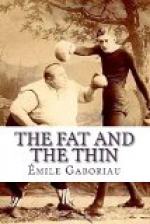God of Heaven! She sold her flowers by the pound! We fled in deep distress. It seemed as though the country-side had been transformed into a huge grocer’s shop. . . . Then we ascended to the woods of Verrieres, and there, in the grass, under the soft, fresh foliage, we found some tiny violets which seemed to be dreadfully afraid, and contrived to hide themselves with all sorts of artful ruses. During two long hours I scoured the grass and peered into every nook, and as soon as ever I found a fresh violet I carried it to her. She bought it of me, and the price that I exacted was a kiss. . . . And I thought of all those things, of all that happiness, amidst the hubbub of the markets of Paris, before those poor dead flowers whose graveyard the footway had become. I remembered my good fairy, who is now dead and gone, and the little bouquet of dry violets which I still preserve in a drawer. When I returned home I counted their withered stems: there were twenty of them, and over my lips there passed the gentle warmth of my loved one’s twenty kisses.
And now from violets I must, with a brutality akin to that which M. Zola himself displays in some of his transitions, pass to very different things, for some time back a well-known English poet and essayist wrote of the present work that it was redolent of pork, onions, and cheese. To one of his sensitive temperament, with a muse strictly nourished on sugar and water, such gross edibles as pork and cheese and onions were peculiarly offensive. That humble plant the onion, employed to flavour wellnigh every savoury dish, can assuredly need no defence; in most European countries, too, cheese has long been known as the poor man’s friend; whilst as for pork, apart from all other considerations, I can claim for it a distinct place in English literature. A greater essayist by far than the critic to whom I am referring, a certain Mr. Charles Lamb, of the India House, has left us an immortal page on the origin of roast pig and crackling. And, when everything is considered, I should much like to know why novels should be confined to the aspirations of the soul, and why they should not also treat of the requirements of our physical nature? From the days of antiquity we have all known what befell the members when, guided by the brain, they were foolish enough to revolt against the stomach. The latter plays a considerable part not only in each individual organism, but also in the life of the world. Over and over again—I




